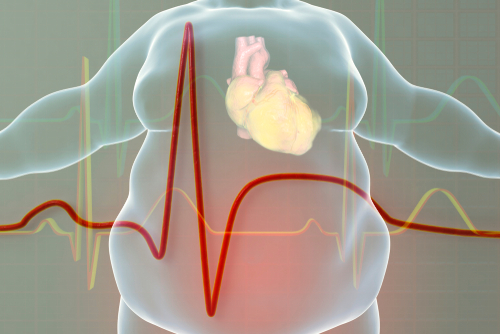
Let’s talk about a topic that’s universally relevant – weight loss. Now, before you start rolling your eyes, we’re not just going to tell you that you should lose weight because society says so. No, we’re going to dig deeper and uncover the real, meaningful reasons why shedding those extra pounds can be a game changer for your life.
Reasons Why You Should Shed Your Weight
Here are some valid reasons why you should shed your weight:
Obesity increases the risk of heart disease and stroke.
Carrying extra pounds can be quite heavy, and not just in the literal sense. Obesity is a silent adversary that quietly paves the way for a multitude of health issues, most notably heart disease and stroke. This connection is not a mere coincidence, but a well-documented medical fact.

Obesity, characterized by an excess of body fat, often results in increased blood pressure and cholesterol – two culprits known to inflict damage on the heart and blood vessels, leading to serious health complications like heart attacks or strokes. So, shedding the weight isn’t just about looking good, it’s about living long and living well.
Losing weight can improve sleep quality.
Ever found yourself tossing and turning at night, desperately seeking slumber’s sweet surrender? The answer to your insomnia might be a surprising one: losing weight. Yes, you heard it right. Shedding off those extra pounds can indeed lead to better sleep quality, a fact backed by numerous scientific studies.
A research conducted by Johns Hopkins University found a significant correlation between weight loss and improved sleep. Overweight individuals who embarked on a weight loss journey experienced enhanced sleep quality, attributing it to the loss of belly fat which often interferes with sound sleep.

Losing weight, particularly in the belly area, can significantly improve your sleep quality. It’s not just about looking good, it’s about feeling good too!
So, next time you find yourself counting sheep, consider hitting the gym instead. Not only will you be working towards a healthier, fitter you, but you’ll also be investing in restful nights and energetic mornings. It’s a win-win!
Obesity is linked to an increased risk of certain cancers.
Carrying excess weight isn’t just about jeans size. It’s an issue that extends to the cellular level, affecting the very blueprint of our health. According to the Centers for Disease Control and Prevention, obesity can significantly amplify the risk of certain types of cancer.
Obesity has been linked with an increased risk of developing various types of cancer, including breast, colon, endometrial, kidney, and esophageal cancers.
Losing weight can improve fertility in both men and women.
In an age where fertility issues are on the rise, a simple change in lifestyle can significantly boost your chances of conception. Studies have shown that weight loss can lead to improved fertility in both men and women.

Here’s how:
- Improved Hormonal Balance: Overweight and obesity often lead to hormonal imbalances, which can affect fertility. Losing weight can help restore hormonal balance, increasing chances of conception.
- Better Egg Quality: In women, weight loss can improve the quality of eggs, which is crucial for a successful pregnancy.
- Increased Sperm Count: In men, losing weight can result in a higher sperm count, thus enhancing fertility.
Obesity is linked to an increased risk of certain cancers.
Did you know that excess body fat can be a silent accomplice to some of the nastiest diseases known to humanity? Among the many health issues linked to obesity, cancer holds a significant place. The risk of developing certain types of cancer, including breast, colon, and kidney, is increased in individuals struggling with obesity.
- Breast cancer: Post-menopausal women with obesity have a higher risk of developing breast cancer.
- Colon cancer: Obesity increases the risk of colon cancer in both men and women.
- Kidney cancer: Obesity could contribute to kidney disease progression, ultimately leading to cancer.
Our bodies are complex systems that react to our lifestyle choices, sometimes in detrimental ways. Maintaining a healthy weight is not just about looking good – it’s about keeping these systems functioning at their best, and cancer at bay.
Obesity can lead to joint problems and osteoarthritis.
When it comes to joint health, maintaining a healthy weight plays a crucial role. Obesity puts undue stress on joints, particularly weight-bearing ones like the knees and hips. This can expedite the wear and tear process, potentially leading to conditions such as osteoarthritis.
Osteoarthritis, the most common form of arthritis, is a degenerative condition that affects millions of people worldwide. It destroys the protective cartilage that acts as a cushion between joints, leading to pain and stiffness.

Obesity is a significant risk factor for osteoarthritis. The extra weight increases the load on your joints, causing damage over time. Moreover, fat tissue produces proteins that can cause harmful inflammation in and around your joints.
- Reducing weight reduces the pressure on your joints, thereby slowing down the degenerative process.
- Weight loss can help decrease inflammation, potentially alleviating some of the symptoms associated with joint problems.
It’s vital to understand the relationship between weight and joint health. Shedding those extra pounds can significantly improve your joint health and overall quality of life.
Obesity is a major risk factor for type 2 diabetes.
It’s an undeniable fact that obesity is a prime risk factor for type 2 diabetes. The link between these two conditions is alarmingly strong; the higher the body mass index (BMI), the greater the chance of diabetes onset. But why does this happen?
When a person’s weight exceeds the healthy range, their body’s system of regulating blood sugar becomes disrupted. This sets the stage for insulin resistance, a key feature of type 2 diabetes.
But fear not, there is a silver lining to this somewhat gloomy cloud. Studies have shown that weight loss, even just a small reduction, can dramatically lower your diabetes risk.
- Physical Activity: Regular exercise not only helps lose weight, but it also increases insulin sensitivity.
- Healthy Eating: Consuming a balanced diet can assist in maintaining a healthy weight and preventing diabetes.
So, battling obesity can do more than just slim your waistline; it’s a powerful weapon against type 2 diabetes. Embrace the challenge!
Obesity increases the risk of developing high blood pressure.
Science has established a direct correlation between obesity and the risk of high blood pressure. This is due to the extra fat tissue that requires oxygen and nutrients to live, which makes the blood vessels work harder, leading to an increase in pressure. Furthermore, they also produce more insulin which can lead to high blood pressure.
- Extra Fat: The additional fat tissue in the body increases the workload on your heart and blood vessels, leading to hypertension.
- Increased Insulin: Overweight individuals have a higher insulin production, which can cause blood pressure to rise.
Keeping your weight in check is crucial to not only prevent hypertension but also alleviate it. Regular exercise and a balanced diet can play a significant role in this aspect.
Conclusion
In conclusion, shedding those extra pounds isn’t just about fitting into your old jeans or looking good for the summer. The effects of weight loss go far beyond the physical, contributing to your overall well-being and quality of life.
“Take care of your body. It’s the only place you have to live.”


























